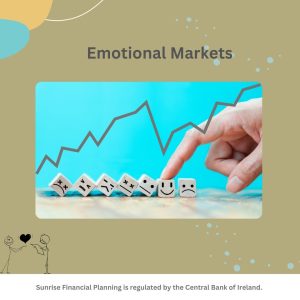Recent events have highlighted that stock markets are deeply influenced by emotions, and not just rational analysis. This phenomenon is known as ‘market psychology’ and refers to the collective sentiment and behaviours of investors at any given time.
Market psychology encompasses emotions such as fear, greed, optimism and anxiety which can drive markets to move in particular aways that are not always justified by fundamental data.
For example, widespread fear can trigger panic selling and sharp declines, while collective optimism or euphoria can fuel speculative bubbles and rapid price increases. These emotional cycles often create boom and bust patterns in financial markets, as investor sentiment swings between extremes of confidence and pessimism.
The recent US tariff announcements caused a wave of fear and volatility causing record-setting market declines and widespread anxiety around global economic growth. The S&P 500 experienced its steepest drop since Covid-19 declining by 4.8% in one single day.
Markets have since rebounded but much of this is based on the expectation that the worst-case tariff scenarios will not happen. However underneath the surface, uncertainty and risk remain high and any follow through on tariff threats could trigger renewed market turmoil.
Understanding market psychology and recognising the role of collective emotions and behavioural bias is essential for investors who want to navigate volatility and make more informed decisions.
In Summary:
- Market volatility is a natural part of investing, often triggered by unexpected events like pandemics (e.g., Covid-19) or geopolitical conflicts (e.g., Russia’s invasion of Ukraine).
- These events can lead to sharp, sudden declines in stock markets, creating fear and uncertainty among investors.
- However, historical evidence suggests that markets generally recover strongly after such downturns, often surpassing previous highs.
- Attempting to time the market—i.e., selling during a crash and buying back later—can be risky and often counterproductive, as it’s difficult to predict when a recovery will begin.
- Investors are encouraged to stay focused on their long-term investment strategies, rather than reacting impulsively to short-term market turbulence.
Key Takeaways for Investors:
- Stay invested: Long-term investors who remain invested through downturns tend to benefit from market rebounds.
- Timing the market is hard: Exiting the market during a crash often results in missing the early (and most profitable) part of the recovery.
- Market resilience: History shows that stock markets are generally resilient and capable of recovering from crises.
- Emotional discipline matters: Emotional reactions to market falls can lead to poor investment decisions.
A Look Back in Time – Stock Market Volatility and Recovery
- Market Movements Are Often Clustered: Historical data over the last 50 years shows that the largest single-day declines in global stock markets often occur in tight clusters—typically during periods of crisis or economic shocks.
- Big Gains Follow Big Losses: Interestingly, these sharp downswings are frequently followed by strong upswings. Some of the market’s best single-day gains have occurred within days of the worst losses.
- Recovery Trends:
- 1-Year and 5-Year Performance: While short-term losses can be significant, markets tend to rebound over time. Historical data indicates that after major daily losses, the global market generally shows positive returns after 1 and especially 5 years.
- This recovery pattern highlights the importance of a long-term investment perspective, even during times of crisis.
- Investor Insight: Although market reactions to unforeseen events can be swift and dramatic, long-term investors who resist panic-selling and stay invested often benefit from the subsequent rebound.
Conclusion:
A robust financial plan which considers your risk profile and capacity for loss will help you maintain is essential for maintain a disciplined approach to your investments. By focusing on your long-term objectives, it will help you navigate market volatility with confidence, minimising emotional decision making.


